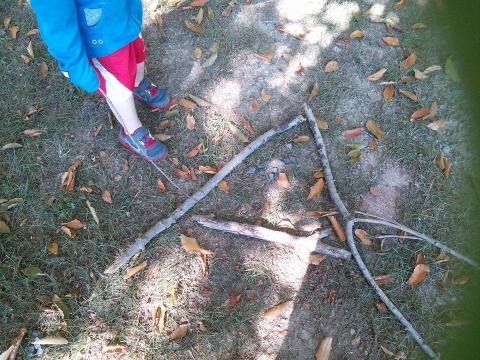
Top 5 Ways to Get Your Kid Ready for Kindergarten (And Pre-K)
Walking at the park with my ten year old during the last week of July, we noticed one single leaf fall off a maple tree. I have gotten used to the signs of Autumn arriving in stores within hours of a the school-closing ceremony each June. I turn my eyes away and stay living in the current season with my children. We trade school books in for giant chalk on the sidewalk; we ditch the textbooks and borrow adventures to read from the library; we let the house get a little messy in exchange for spur-of-the-moment day trips.
After twenty-five years of teaching in early childhood education, I am used to the rush put on moms for “Back to School” shopping. I know that there is no need to rush it. Having a child truly ready to learn; ready for kindergarten can (and does) happen outside of a store without pressures. It's every day. It's in play. It's in conversation. It's in listening and being present with the children. Being prepared for Kindergarten is a process that starts in the first five years.
Many parents and communities support high quality pre-kindergarten programs as a means to support Kindergarten readiness. Some parents prefer to find high quality early learning activities within the structure provided in a traditional preschool; or a Montessori-setting; some find a nature-based preschool; and some make it work at home. Regardless of the “title” of the setting, the high quality learning environments get the children ready for Kindergarten in five key areas.
In early August as you start your Back-to-School shopping, keep these five key areas in mind for truly having your child Kindergarten (and pre-kindergarten!) ready!
1. Social & Emotional : Tears and Words are okay!
The biggest piece of having a child ready-to-learn is addressing their social & emotional needs. Young children are generally very expressive. They feel everything. In turn, the express everything in the only means they have learned. High quality early learning offers the child new words and modes of expressing the full range of human emotions. In a high quality preschool setting, you will see simple emotion faces and lots of emotion words. The children will have opportunities built into the course of their day to hear and use new words to express emotions. Children will be encouraged and allowed to express themselves in words, art, play that are safe and do not threaten the safety of another. Opportunities to build relationships amongst classmates and trusted adults are provided through open play activities as well as modeled scenarios. When your child is able to express a variety of emotions and is able to navigate a friendship or two, he/she is ready to learn.
2. Language: Word As Bridges to the World!
Starting with the social emotional foundation for learning about our emotions and attaching verbal and sight cues to them are a great way to begin to build language. Being ready to learn requires being capable of expressing thoughts. Most children learn to speak, hear, and see symbols that mean something. In high quality pre-k programs, early literacy happens when children understand a symbol has meaning. Road signs are a great example of this. However, so is the “marking” a child makes to identify a name. Some children because of physicial limitations can learn that hand signs express thoughts and language. Many children learn multiple languages. The common denominator is that the 3-5 year old is building a common language with the community around him or her.
3. Math: Shopping, Cooking, and Counting!
Symbols mean something. Numbers are a part of those symbols and a very important one. Beginning to connect the abstract concept of amounts is a helpful piece for a child to be ready-to-learn in kindergarten. Beyond rote-counting a child needs to acquire the ability to name the numbers in order include while understanding their placement is not random. High quality early leanring activities to support this can include cooking activities (measuring, weighing); shopping (counting out pennies & coins); sorting materials.
4. Approaches to Learning: Curiosity Grows the Kid!
A child’s interest in continuing to learn is a key to their being ready-to-learn. A child needs to have a level of self-motivation in their learning. External motivators are not helpful for maintaining an on-going personal commitment and drive. Children need to develop some level of endurance and resilience in learning. Mistakes happen and are a part of the learning process. If a child fears making a mistake or needs consistent praise for every step of the learning process, they will lose interest. A child ready to learn in kindergarten is one that enjoys the process; not only an outcome or reward. High quality pre-k programs and activities offer encouragement throughout an activity. These programs will also be open to change curriculum units or subjects to meet the natural interest the child is showing in a specific subject or material.
5. Physical Development: Healthy Kids & Healthy Minds!
Children are growing at the fastest rate their bodies will every grow in the first five years.
Paying attention to their health and well-being encourages an ability to be able to learn. If a child is hungry, sick, cold, or tired attention is distracted. As a result this child will not be ready-to-learn. High quality early learning programs pay attention to the physical needs of the child. Some children learn kinesthetically. As a result the high quality pre-k class or activity offers opportunities for learning through movement. The high quality educators show a value for fruits, vegetables, and an active life style in their classrooms and homes.
The Delaware Valley Association for the Education of Young Children (DVAEYC) provides a free online library for parents and educators to help guide children through best practices for early learning. You can find the most recent publication, Kindergarten Entry Parent Resources here: http://www.dvaeyc.org/images/cms/file/DVAEYC%20Library/Kindergarten_Entry_Parent_Resource.pdf
In addition, whether parent, grandparent, community leader or business person - everyone can help support young children by making early learning a priority in their state. Find out what grades your Pre-K programs earned in your state at the NIEER report here: http://nieer.org/publications/state-preschool-2013
In Pennsylvania, learn more and join the movement called Pre-K for PA: for all 3 & 4 year olds in Pennsylvania to have access to high quality pre-k here: www.prekforpa.org



The views and opinions expressed in this post are those of the author(s) and do not necessarily reflect those of MomsRising.org.
MomsRising.org strongly encourages our readers to post comments in response to blog posts. We value diversity of opinions and perspectives. Our goals for this space are to be educational, thought-provoking, and respectful. So we actively moderate comments and we reserve the right to edit or remove comments that undermine these goals. Thanks!